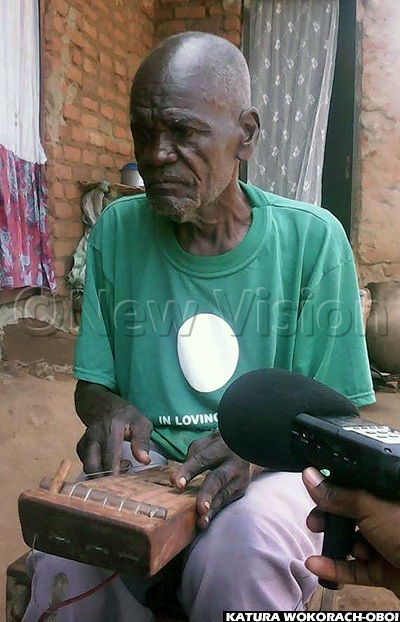Clipper Ogwang: Legendary Ugandan musician dies at 84
He breathed his last from his hospital bed at Gulu Regional Referral Hospital a few minutes after 8am on Thursday.
DEATH | ENTERTAINMENT
GULU - Renowned Ugandan musician Clipper (also written as Clippa or Kilipa) Ogwang has died at the age of 84 after being hospitalized for nearly a week.
He breathed his last from his hospital bed at Gulu Regional Referral Hospital a few minutes after 8am on Thursday, his daughter, who was by his side at the time of his death, told Vision Group's Radio Rupiny.
Fiona Akwero said her father was admitted at the facility in northern Uganda on Saturday after complaining of lower abdominal and chest pain.
She told Radio Rupiny that his condition deteriorated on Wednesday.
"When he was brought to the hospital on Saturday, he was still able to speak. But he started having difficulty breathing yesterday [Wednesday]. When I arrived at the hospital this [Thursday] morning, he was convulsing.
"He died a few minutes after as I sat by his side," said Akwero.
She said Ogwang was battling diabetes and hypertension. It was established that his kidneys were also failing.
Tributes have continued to flow for the man who gained legendary status for his musical appeal in especially Acholi region, in which he expertly played the nanga, a traditional string instrument likened to an African harp.
He is said to have been one of the most experienced and respected nanga players in northern Uganda.
His songs, like Kic (loosely translated to mean honey) and Wilobo Okwanyi Mega (in which he complains that all his children were taken from him) endeared him to many.
Ogwang also sang Tim Abo (meaning adultery), Ero Alli Ki Jo Mapol (meaning you started enmity with many people) and Mac owango Oyite woko (which can be translated to mean 'Fire burned Oyite').
(Below is a YouTube video by Scandal Studios showing Ogwang performing Wiye olal woko (translated as 'His head scattered') together with his wife Sabina Lawino)
Profile of an Acholi legend
Ogwang was born in 1936 to Bala Nakuconi Bala and Dolopina.
Before his death, he and his sister Nekolina Akot were the only living children of the eight that their parents had together.
Ogwang was reportedly being taken care of by his eldest son.
He started his music career in 1954, reportedly learning to sing from his father at the fire place. His father used to play the nanga and when he was out in the garden, Ogwang would sneak into their house, pick the instrument and learn how to play it.
In later interviews, Ogwang spoke of how his father would notice he had tampered with instrument and would get angry at him.
One of his favorite songs was Ngom Kwaro Tye Malo. He said he always missed home and longed for when he would return to his ancestral home, since he was living outside home most of the time.
In fact, it is this very song that he reflected on when his son picked him from Kitgum in 2017 and took him to his ancestral Olupe Opong village in Agago district.
At the time of his death, Ogwang has over 450 songs to his name.

In 1956, he learnt how to play the guitar and later emerged the champion in guitar competitions in Agago, Omoro and Chua. He also represented northern Uganda in regional competitions, before retiring from playing the instrument in 1960.
From 1960 until 1962, he explored his talent in the Larakaraka (courtship dance).
Ogwang formed a dingi dingi dance team. At that time, there was a traditional dance competition and Erinayo Wilson Oryema (Uganda's first African Inspector General of Police) was sent to select the best performing team for a regional competition.
Out of 11 teams in the contest, Ogwang's crew emerged the best and was selected alongside another team from Opete and Kitgum.
They were sent to Gulu, before making it beyond the borders to Egypt, Nigeria and West Germany. While in Egypt, Ogwang initiated the formation of Heartbeat Africa, a traditional dance union.
Later, he resumed his famous nanga music. In the evening of his life, health problems made it difficult for him to play the instrument he had grown to love right from his childhood.
From 1971 until 1979, Ogwang worked as an entertainer in Ugandan hotels, tasked with entertaining guests in the evening hours.
In the late 1980s and early 1990s, he worked as a nursing assistant at Kitgum Hospital at a time when many health workers had fled because of the insurgency by the Lord's Resistance Army led by Joseph Kony.
Basically, Ogwang offered support in caring for war victims, who would check in for treatment of their wounds at the facility.
He is documented to also have been a traditional healer, treating cases of snake bite and extreme pregnancy pain, among other things.